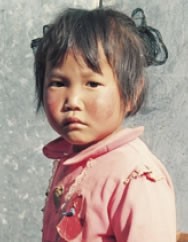Sansu in China

Photo Source:
Copyrighted © 2026
Operation China, Asia Harvest All rights reserved. Used with permission |
Send Joshua Project a map of this people group.
|
| People Name: | Sansu |
| Country: | China |
| 10/40 Window: | Yes |
| Population: | 17,000 |
| World Population: | 17,000 |
| Primary Language: | Hani |
| Primary Religion: | Ethnic Religions |
| Christian Adherents: | 3.00 % |
| Evangelicals: | 2.24 % |
| Scripture: | Portions |
| Ministry Resources: | Yes |
| Jesus Film: | Yes |
| Audio Recordings: | Yes |
| People Cluster: | Hani |
| Affinity Bloc: | Tibetan-Himalayan Peoples |
| Progress Level: |
|
Introduction / History
For reasons of perceived historical kinship, the Sansu - along with more than a dozen other tribes - have been included in the Hani nationality by the Chinese authorities, who are not apt to grant official status to minorities with relatively small populations.
Although the Sansu speak their own distinct Tibeto-Burman language, they do not possess an orthography. In 1957 the government tried to introduce a Roman script for the various Hani peoples in Honghe. The authorities' unwillingness to recognize the true linguistic diversity among the different groups caused the project to fail. Groups like the Sansu did not use words found in the "Hani language" literature. The Sansu were originally a non-Tibeto-Burman-speaking tribe who were taken as slaves and had another language imposed on them.
For generations the Sansu were slaves of the ruling Yi people. "They are considered very low on the scale of tribal society, actually being servants to the Lolo [Yi] tribe and given so little recognition by the government that they are even exempt from taxation and military service. Tattered, torn, scanty togs; coarse mountain food; dark smoky hovels, these are their daily lot. The Sansu are some of the earth's poorest."
What Are Their Lives Like?
The various Hani related peoples, including the Sansu, have developed a long list of "at least 500 known medicinal plants as well as medicinal practices such as bone-setting, massage and blood circulation techniques."
What Are Their Beliefs?
The Sansu are zealous polytheists. They worship a multitude of evil spirits who rule over them. The Sansu also venerate their ancestors, especially the spirits of their in-laws.
Of the more than 1,000 Hani Christians reportedly living in Yuanjiang County, approximately 200 to 300 are believed to be members of the Sansu tribe. China Inland Mission's John Kuhn - who conducted an intensive ethnic survey of Yunnan Province in 1945 - joyfully recounted his meeting with the first Sansu believer. "At Yuanchiang [Yuanjiang] on the Red River, my cup ran over! I saw my first Sansu. I had never heard of that tribe before. And there, my first Sansu sat before me, little of stature, shy, quiet, with a soft voice and distant look. His awkwardness bespoke his inner thought, 'Why should the white man wish to talk to me?' Simply because the white man wished to size up a Sansu, lowest in the scale of humanity of those parts, yet an object of the grace of God, for he had been brought to Christ by a Lolo. Wonderful! Are there any more Sansu? Yes, many more. Then we can expect a grand harvest, for the saving of the first is proof that He can save all."
What Are Their Needs?
There is a good gospel footprint among the Sansu people, but they need it to affect every family in their community.
Prayer Points
Pray for the Holy Spirit to direct Sansu family heads to teach the ways of the Lord to their children no matter what the cost.
Pray for Sansu disciples to make more disciples.
Pray for the Sansu church to be so overwhelmed by the Lord's holiness that they can't help but tell others.